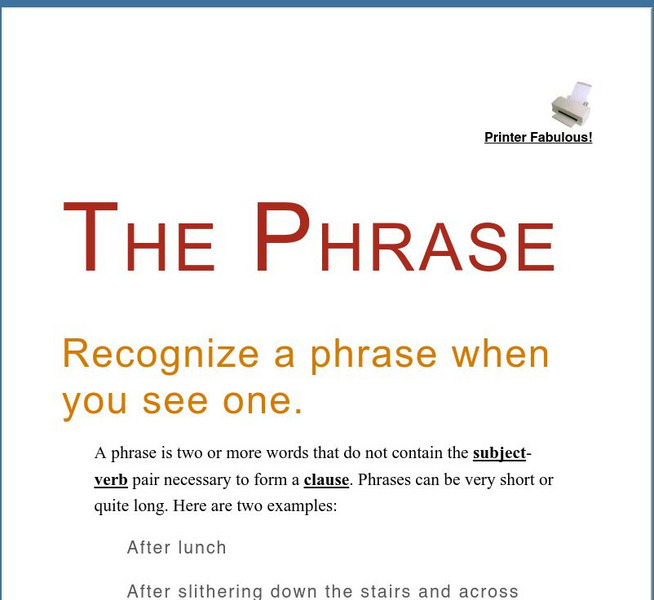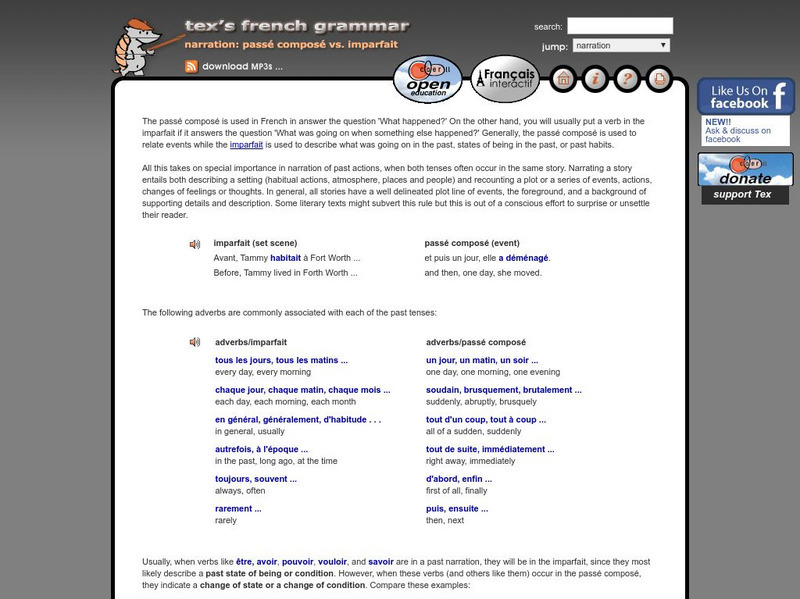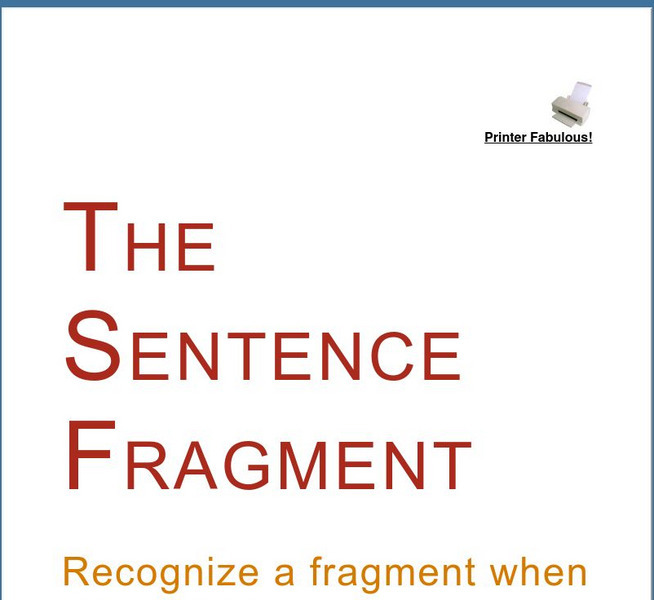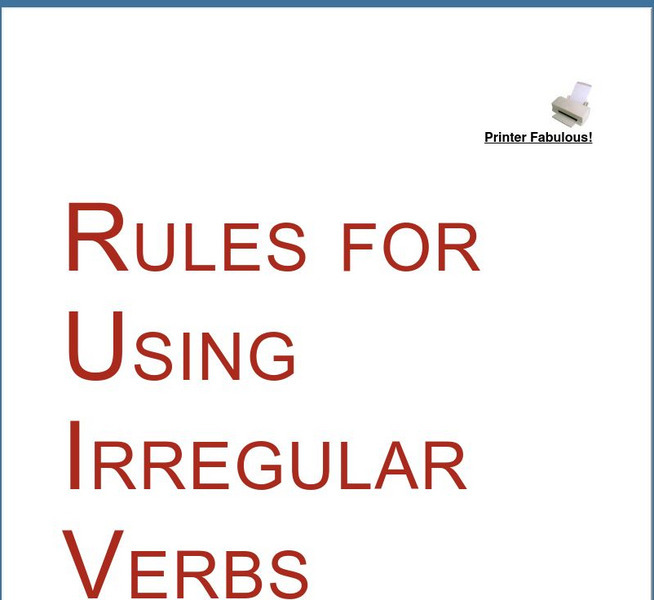University of North Carolina
The Writing Center at Unc Chapel Hill: Passive Voice
How can you avoid the passive voice in your writing? Explore this website to learn how and why not to use this voice in your writing.
Other
Using English: Glossary of English Grammar Terms
A comprehensive A-Z index of grammar terms with explanations and examples. Each entry provides links to activities and other resources available on the site for more practice on that aspect of grammar. Suggested activities are often...
Study Languages
Study Spanish: Past Perfect
Excellent explanation of the formation of the past perfect tense. Free, interactive activities include an online quiz and test for mastery. The printer friendly page makes a nice review master for students keeping a notebook.
Study Languages
Study Spanish: Present Perfect
A straightforward explanation of how the present perfect tense is formed with a printer-friendly page that is great for note keeping. One free online quiz and test evaluate mastery.
University of Texas at Austin
University of Texas: Francais Interactif
This full-featured interactive textbook encounter utilizes French speakers in real life scenarios. Well structured for work on grammatical concepts (links to Tex's French Grammar), vocabulary, listening comprehension and exposure to...
Texas Education Agency
Texas Gateway: On Track English I Writing: Editing
This site offers links to each section of Writing, Module 8, Lessons 1-9 and Practices 1-3. Students write legibly and use appropriate capitalization and punctuation conventions in their compositions; spell correctly; and edit drafts for...
Robin L. Simmons
Grammar Bytes: Exercise 4: Identifying the Different Types of Fragments
Practice sentence skills by identifying the type of fragment in each short passage: subordinate clause, participle phrase, infinitive phrase, afterthought, lonely verb, or appositive.
Online Writing Lab at Purdue University
Purdue University Owl: Irregular Verbs
Here is a list of common irregular verbs showing the present, preterit, and past participle. Includes charts for rise vs. raise, sit vs. set, lie vs. lay, which will help prevent misusing these verbs.
PBS
Pbs Learning Media: When to Use the Past Tense for Irregular Verbs
Often when we write the past tense of a regular verb, we add an "-ed" after the last letter. Irregular verbs do not follow this rule! The simple past and simple participle of irregular verbs can end in a variety of ways with no...
Capital Community College Foundation
Guide to Grammar and Writing: Irregular Verbs
An extensive look at verbs in all their various forms and uses. A very valuable and easy to understand resource with many examples.
Robin L. Simmons
Grammar Bytes: The Auxiliary Verb
Printable information is provided that demonstrates how to identify an auxiliary verb in the context of a sentence.
Robin L. Simmons
Grammar Bytes: Phrase
Printable information is provided that demonstrates how to identify a phrase in the context of a sentence.
Robin L. Simmons
Grammar Bytes: The Gerund Phrase
This grammar tutorial for understanding the gerund phrase demonstrates how to use gerund phrases properly in sentences.
Colby College
Spanish Language & Culture: The Present Perfect Tense
Review examples and then complete three online exercises dealing with the present perfect tense. English translations are provided for some of the examples. The first exercise provides verb infinitives as cues for the present perfect...
University of Texas at Austin
Tex's French Grammar: Passe Compose of Pronominal Verbs
This site from Tex's French Grammar clearly explains the uses, formation and negation of the passe compose with pronominal verbs, using high quality examples, dialogues, (both written and audio), and interactive exercises.
University of Texas at Austin
Tex's French Grammar: Passe Compose vs. L'imparfait
This site from Tex's French Grammar provides a very clear and concise explanation of the proper formation and usage of the passe compose and l'imparfait. Lists common verbs and adverbs associated with either of the tenses. Provides good...
Robin L. Simmons
Grammar Bytes: Word Choice: Ex. 1: Recognizing Misplaced and Dangling Modifiers
Read about misplaced modifiers, and then practice by if the modifiers in twenty sentences are placed correctly. Feedback is provided after each sentence.
Robin L. Simmons
Grammar Bytes: The Sentence Fragment
Printable information is provided that demonstrates how to identify a sentence fragment.
Robin L. Simmons
Grammar Bytes: The Sentence Fragment
Printable information is provided that demonstrates how to identify a sentence fragment.
Robin L. Simmons
Grammar Bytes: The Noun Phrase
Printable information is provided that demonstrates how to identify a noun phrase in the context of a sentence.
Bartleby
Bartleby.com: Elementary Rules of Usage
Passage from William Strunk's "Elements of Style" explains how the placement of a participial phrase determines if it refers to the subject of the sentence. Examples.
Robin L. Simmons
Grammar Bytes: Irregular Verbs: Rules for Use
Grammar rules are provided for irregular verbs. Includes examples and tables.
Sophia Learning
Sophia: Regular vs. Irregular Verbs: Lesson 3
This lesson defines regular and irregular verbs and provides a list of common irregular verbs.
Capital Community College Foundation
Guide to Grammar and Writing: Irregular Verbs Crossword Puzzle
Online crossword from the Capital Community College that reviews simple past tense and past participles of irregular verbs. Options for seeing hints and doing over the incorrect answers.
Other popular searches
- Past Participles
- Past Participle Verbs
- Gerunds and Participles
- Participle Clauses
- Irregular Past Participles
- Past and Present Participle
- Participle Phrases
- Infinitives and Participles
- Present Participle Verbs
- Noun Adjective and Participle
- Present Participles
- Gerund and Participle Phrase























